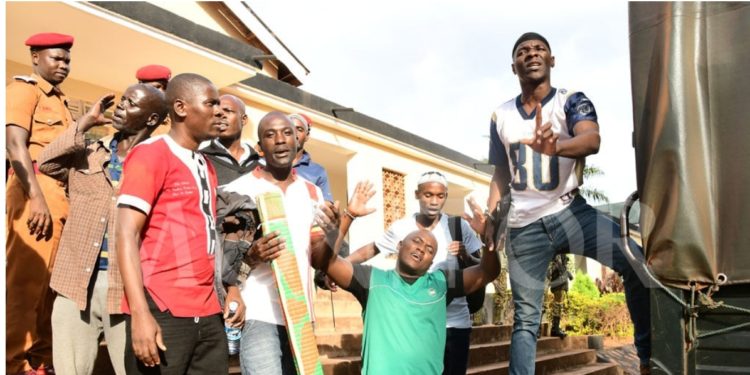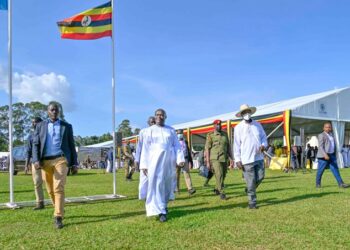By Aggrey Buluba
As Uganda gears up for the 2026 elections, the political climate is getting increasingly tense. National Unity Platform (NUP) members have begun admitting guilt after being detained for years without trial. This situation raises important questions about its impact on both the opposition and the ruling National Resistance Movement (NRM). Let’s examine the implications of these guilty pleas, the alleged coercion behind them, and what this means for Uganda’s political landscape as the elections approach.
The NUP, led by Robert Kyagulanyi, also known as Bobi Wine, has emerged as a strong voice against the long-standing NRM government. Many NUP members have been arrested and reportedly subjected to harsh conditions in prison. Recently, several prisoners have started pleading guilty to charges such as treason and terrorism. This change comes after years of being detained without trial, with some facing military court proceedings despite being civilians. This has led to allegations of abuse and mistreatment.
In this context, the guilty pleas raise serious concerns about the fairness of the legal system. The government has often been accused of struggling to provide substantial evidence against many of these prisoners, raising suspicions that they are pleading guilty out of fear or desperation. Reports suggest that influential figures within the regime have coerced these prisoners into confessing guilt. It is suggested that if these individuals do not plead guilty and apologize to President Museveni, they will continue to suffer in prison, creating a troubling atmosphere of coercion.
The situation of the NUP prisoners mirrors past political events, particularly in the case of Col. Kizza Besigye. After declaring himself president and accusing President Museveni of rigging the 2016 elections, Besigye was arrested and charged with treason. However, it is said that the government struggled to present solid evidence to support these serious allegations. The case lingered for years without a verdict, reflecting a justice system seemingly more focused on silencing dissent than upholding the rule of law.
The arrest of Robert Kyagulanyi during the 2018 Arua by-election, where police claimed he was found in possession of an illegal firearm, highlights the NRM’s treatment of opposition figures. Despite being acquitted later on, the alleged gun was never presented in court, and it has not been returned to him. These incidents indicate a troubling trend where the government seems to use accusations as a means of oppression rather than seeking justice.
For the NRM, this situation is a double-edged sword. By allegedly coercing guilty pleas from NUP members, as claimed by NUP leadership, the regime aims to damage the opposition’s reputation. This strategy allows the NRM to depict the NUP as a violent and disorganized group, reinforcing the perception that they pose a threat to peace and stability. The guilty pleas serve as ammunition for the NRM, justifying longstanding accusations of brutality against opposition supporters and potentially swaying public opinion away from the NUP.
Timing is crucial in politics, and the NRM may see these guilty pleas as a way to undermine NUP support just before the elections. By portraying the opposition as incapable of protecting its members, the NRM could dissuade potential supporters, who might hesitate to support a party that appears vulnerable. Voters might see the NUP as a sinking ship, and in such times, many prefer to align with a more stable party.
However, the government’s history of using flimsy evidence, as alleged by different opposition leaders, against them may backfire. Just as Besigye’s prolonged case and Kyagulanyi’s gun allegations raised doubts about the government’s motives, the recent guilty pleas could evoke skepticism. If voters perceive the government as manipulating the judicial system, they might become disillusioned with the NRM and its alleged tactics.
However, the NRM’s tactics may not be as beneficial as they hope. The allegations of coercion could spark outrage among the public. Human rights activists and international observers are likely to condemn the government’s actions, creating a backlash that could strengthen the NUP’s position. If the opposition can convince people that these guilty pleas stem from fear, promises of heaven on earth and not truth, they may rally support and win over those sitting on the fence.
The NUP must tread carefully, balancing the need to highlight the alleged injustices faced by its imprisoned members while also ensuring they do not alienate potential supporters. By focusing on the unfairness of the situation and the government’s alleged oppressive tactics, the NUP can position itself as a defender of human rights and democracy. This message may resonate with a population increasingly tired of government overreach, especially younger voters who value fairness and accountability.
Therefore, as Uganda moves closer to the 2026 elections, the situation surrounding the NUP prisoners and the NRM’s alleged strategies could lead to heightened tensions. The government’s alleged approach might create an even harsher environment for opposition parties, leading to a cycle of repression that discourages active political participation. Many citizens might feel disillusioned by a system that seems to punish dissent, resulting in lower voter turnout and potential unrest.
On the flip side, if the NUP can successfully leverage public sympathy for its imprisoned members, it may create a rallying point for campaigns advocating for political freedoms. The stories of these prisoners could fuel protests and drive home the need for change. If the NUP can mobilize public sentiment around these issues, it could strengthen its position and emerge as a more formidable force in the lead-up to the elections.
In conclusion, the recent guilty pleas from NUP prisoners present a complex challenge for both the opposition and the NRM as Uganda prepares for the 2026 elections. For the NRM, these developments could serve as a weapon to undermine the opposition while also risking public backlash against their coercive tactics. Meanwhile, the NUP faces both challenges and opportunities as they work to rally support by advocating for justice and human rights.
Therefore, as the electoral landscape shifts, the consequences of these guilty pleas will echo throughout Uganda. How both parties navigate this complicated terrain will ultimately shape the country’s democratic future. The road to the 2026 elections promises to be filled with fierce competition, rising tensions, and a population increasingly aware of the importance of justice and accountability in governance. In the end, the voice of the people will be the compass that guides Uganda’s political destiny.
The author is a patriot, nationalist, and a social-political observer!







Discussion about this post